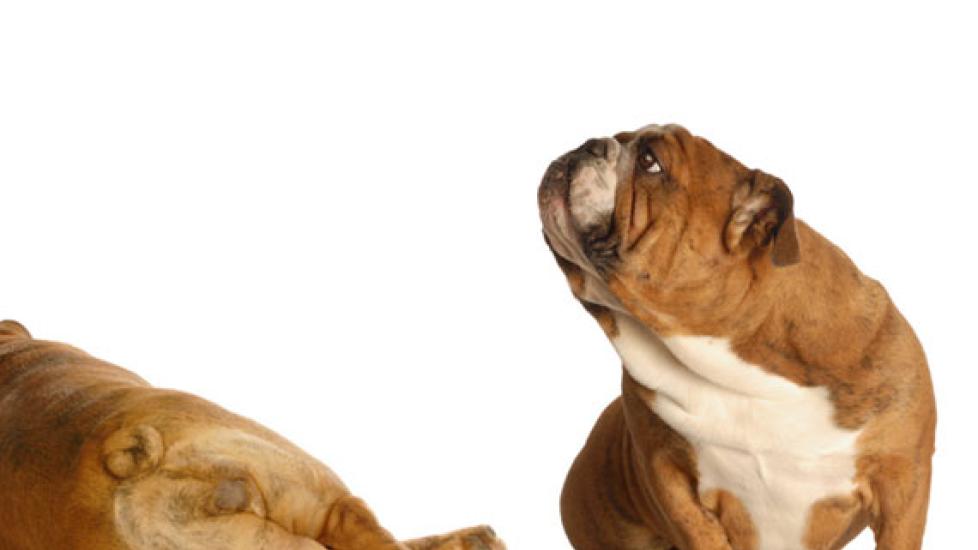Gas in Dogs and Cats: Dealing with Fetid Flatulence
By Patty Khuly, VMD
Despite the cheeky title, flatulence can be a serious business, indeed. Yet in vet school I don’t recall gas ever getting its due.
The flashier subjects of diarrhea and vomiting in dogs and cats always overshadowed "excessive intestinal gas production" when discussing the category of gastrointestinal ailments. And while that’s understandable, flatulence needn’t be ignored. Ittoo deserves to be treated with respect. After all, pets that suffer through this condicion aren’t just annoying those around them, their bodies are telling us something about how they’re ingesting and/or digesting (or failing to digest) the foods we give them.
Make no mistake: Flatulence is 100 percent normal and physiologically appropriate in most cases. But even when it is normal, that doesn’t mean it’s a welcome punctuation to our pets’ post-prandial slumbers. No.
Why Does My Dog or Cat Have Gas?
So why exactly is so much nasty gas coming out of the business end of nature’s most efficient composter? Here’s a short list of possibilities:
Too much gas going in
- Eating food too quickly causes excess air ingestion
- Chewing certain toys or rawhide-style chewies may cause chronic, inappropriate ingestion of air
Too much gas production inside the digestive tract
(bacteria, the gut’s co-digesters, cause the release of gas during digestion)
- Dietary intolerances
- Food allergies (sometimes it’s not just the skin that is affected)
- Bacterial overgrowths secondary to dietary indiscretion (garbage eating, etc.)
- Chronic bowel diseases (as diverse as parasitism and cancer)
- Pancreatic disorders
To determine the causes for excess gas, stool checks, bloodwork, X-rays, and ultrasound are the standard methods of diagnosis, but sometimes endoscopy (think colonoscopy), abdominal exploratory surgery, and CT scans are required to get to the bottom of it. Yes, even flatulence disorders can be hard to diagnose.
Most of us stop short of using invasive methods when it comes to something as seemingly silly as gas in dogs and cats, but where there’s smoke, sometimes there’s fire. That’s why severe acute or worsening conditions are often best dealt with more aggressively.
For most common gas issues, however, I like to try the simple tricks they never taught us in vet school.
Vet-Approved Tips for Resolving Gas in Dogs and Cats
Here’s a list of "it’s worth a try" methods best employed after your vet has done her basic workup and can’t find an obvious source of the dilemma:
A change of diet
Perhaps some ingredient is simply giving your pet gas. Just like people, pets can be intolerant of proteins and/or carbohydrates. Eliminating ingredients one by one every week or two is probably the best approach, but simply picking out a new, lower-residue diet has worked for many pets whose owners are more time-challenged (as always, consult a veterinarian before drastically changing your pet’s diet and make the changes slowly by carefully mixing in the new diet over a period or so).
For pets that are potentially allergic to foods, a diet using novel proteins and carbohydrates is recommended. Switching (again, slowly) to a diet with none of the same proteins and carbohydrates fed previously might make the difference.
Feed smaller meals more often
Some pets are just pigs, gulping mouthfuls of air along with their food. Slowing the process down helps, and frequent, smaller feedings are one way to accomplish this goal. You can also look for pet food bowls that are specially designed slow down the eating process.
Probiotics/Prebiotics
Probiotics and prebiotics may be able to improve your dog or cat’s digestive health by increasing numbers of beneficial bacteria in the gut. Speak with your veterinarian about their differences and how each can help your gassy situation.
Charcoal
Apparently, some gastrointestinally-focused internal medicine specialists like to use charcoal tablets to speed the nasty bacteria through the GI tract.
Consult Your Veterinarian
Some breeds are uniquely sensitive to certain proteins or carbohydrates so it’s important to speak with a veterinarian if your pet has excess gas. For example, I’ve heard that elkhounds can’t tolerate peanut butter for all the gas it gives them. Go figure.
Image: WilleeCole Photography / via Shutterstock
